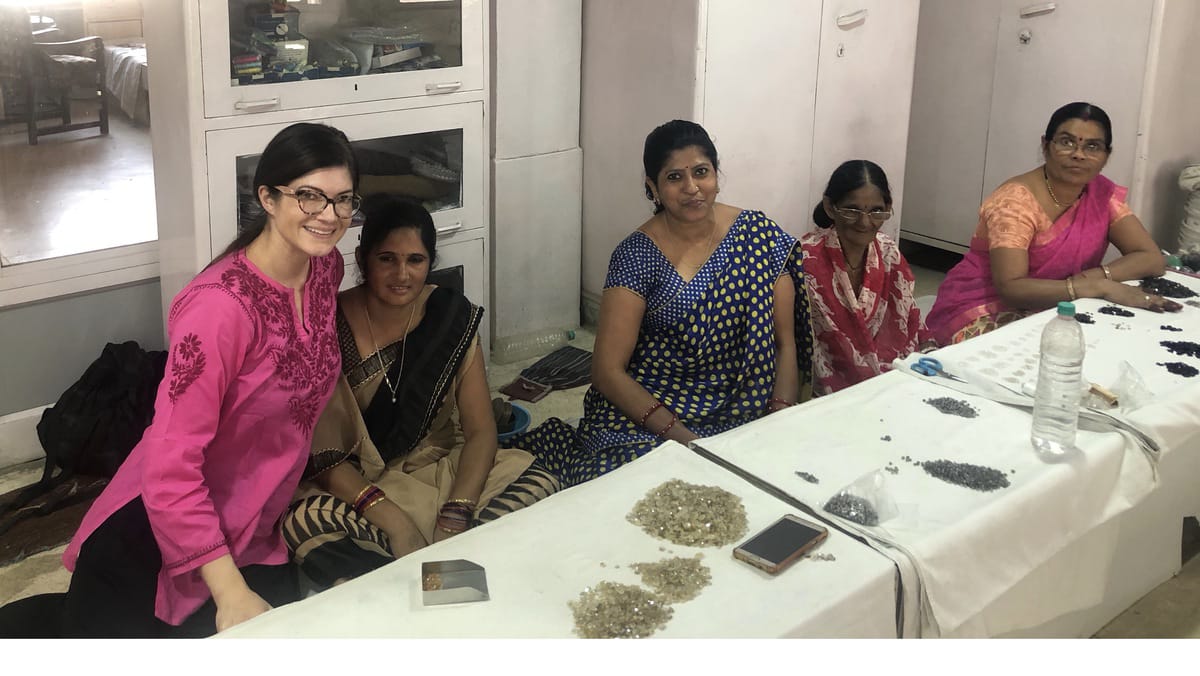‘Conscious consumerism’ is an increasingly popular concept that promotes the idea of making deliberate and educated purchasing decisions. It is predicated on the notion that consumers can contribute to the development of a more ethical and sustainable economy by researching the businesses from which they are buying, and being aware of the labor practices, sourcing methods, and environmental implications of the products they purchase. By doing this, they can support businesses that align with their own values and ensure their money is being used in a manner that is beneficial to both the consumer and the business. Therefore, conscious consumerism can be seen as an effective tool for creating a more equitable and responsible economic system that benefits all stakeholders. A clever former fashion model and teacher, Katherine Parr, took this responsibility on herself to explain to the public understand the true power of ‘conscious consumerism’ through her speech.
Katherine’s expertise as the founder of two small ethical luxury businesses, tells us that conscious consumerism can be beneficial for the underserved population in developing nations the underserved population in developing nations, by enabling them to have a more pronounced impact on the assortment of products and services available in their localities. Conscious consumerism can help increase cognizance of the struggles of those living in underdeveloped areas, which can lead to an influx of charitable contributions and dignified economic support from the wider public.
Katherine Parr is an American entrepreneur, designer, philanthropic advisor, public school teacher, and former fashion model. Following graduation from Villanova University School of Business as a young adult, she pursued a career in modeling but eventually decided to use her intelligence and creativity in a more meaningful way. She co-founded the ethical chocolate company Parré Chocolat, where she now heads the social responsibility, working with farmers in Guatemala and Colombia to provide dignified employment and infrastructure. Prior to this, she lunched her eponymous jewelry business, Katherine Parr Jewelry, which has been a great success.
Parr and her husband, renowned investment banker and private equity executive Gary W Parr, had a dream to provide ethical luxury chocolate to consumers in the United States, therefore, co-founded Parré Chocolat, a direct-to-consumer ethical luxury chocolate company that works with farmers in Latin America. Their chocolate has quickly gained recognition, and soon it was served in the U.S. Open luxury lounges and Aces Restaurant, New York City Opera, the Museum of Modern Art, and various corporate dining rooms in New York City. The couple’s passion for deliciously ethical chocolate and diligence toward bringing happiness to both consumers and farmers alike has made Parré Chocolat a success.
There is no doubt that Parr has dedicated her life to giving back and supporting those in need. From joining the advisory councils of Education for Employment and Custom Collaborative, two of the leading nonprofits in the Middle East North Africa region and Harlem respectively, to forging a seven-year designer partnership with Turquoise Mountain NGO, Parr has lent her helping hand to vulnerable communities in conflict zones, such as Afghanistan and Syrians living in Jordan. Through her business and philanthropic work, she has provided education and job opportunities to underserved and at-risk youth and immigrant women of color. Parr’s work has opened new pathways for those in need and helped many to achieve their dreams.
In 2018, Katherine was invited to give a TEDX Talk in the winter of 2019. Taking her experience in the luxury goods industry and her work with underserved farmers and artisans around the world, she selected the topic of Conscious Consumerism as the Road to Economic Empowerment to an international sophisticated audience at the Museo Tamayo in Mexico City. She spoke of the importance of making intelligent purchasing choices that considered the social and environmental impact. The discussion was a compelling and inspirational argument on how we can mobilize our purchase power to “wear our values” and improve the lives of our shared community as empathetic global citizens.
As she spoke, it was clear that the $2.4 trillion garment industry was plagued by human rights issues, low wages, and mistreatment of the mostly female workforce. The audience learned that the problems don’t stop there – 5 million women and children in the jewelry industry are also facing these same issues. And to Parr, it was time for a clear solution to the problem, for which she proposed ‘conscious consumerism.’ Buying with intent, with purpose, and with respect for ethical and transparent supply chains could make a difference in developing nations and beyond. Parr firmly believes that with our conscious purchases, we can empower the artisans, factory workers, and farmers in developed and developing nations with the respect they deserve.
Parr suggested that through the simple act of purchasing a chocolate bar, or a piece of jewelry, people could contribute to the income of the farmers who produce the goods in developing nations. By investing in the same brand repeatedly, the farmers would be able to use the money to improve their homes, provide healthcare for their families, and ensure their children, including often omitted girls, might have access to education. Parr expressed that the loyalty of chocolate (or jewelry) lovers could make a real difference in the lives of those in the supply chain over the long term.
The talk was well-received by an international audience, subsequently featured on Ted.com as an exec and 18 months after it was released, the world watched as Afghanistan fell to the Taliban, and the TEDX talk was removed from its TED.com feature for over a year in order to protect the women Parr featured. The words of Katherine Parr still echo in the minds of many that saw the talk in person, or watched the talk as it went viral, inspiring them to make more mindful purchasing decisions and therefore a greater impact on the world, very simply “one chocolate bar, one necklace at a time.”
